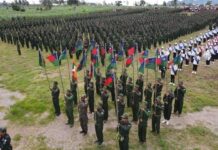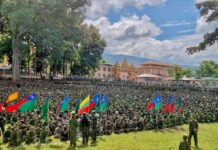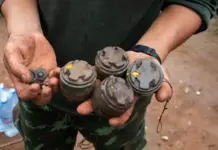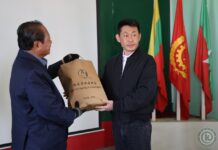Hardly has the sharp tone of the Commander-in-Chief Min Aung Laing died down, when he sabotaged the top leaders’ meeting of government-military and Ethnic Armed Organization (EAOs) in Naypyitaw, by attacking the Restoration Council of Shan State (RCSS) and accusing it of troops built up, including area expansion, misusing the Nationwide Ceasefire Agreement (NCA), the Karen National Union (KNU), on October 27, comes up with a temporary hiatus from peace process meetings until it has sorted out things among themselves.
 Reportedly, Gen Mutu Say Poe head of the KNU was blamed for rushing in without enough preparation and the endorsement of the majority of KNU into the meeting, which in the end resulted in the negative outcome. So much so, he wrote in his letter to State Counselor Aung San Suu Kyi that it is necessary to clarify the outcomes of the top leaders’ meeting in Naypyitaw to his organization and also to find common ground among themselves, on how to go about with the peace process.
Reportedly, Gen Mutu Say Poe head of the KNU was blamed for rushing in without enough preparation and the endorsement of the majority of KNU into the meeting, which in the end resulted in the negative outcome. So much so, he wrote in his letter to State Counselor Aung San Suu Kyi that it is necessary to clarify the outcomes of the top leaders’ meeting in Naypyitaw to his organization and also to find common ground among themselves, on how to go about with the peace process.
The KNU letter signed by Mutu reasoned that the suspension is necessary “in order to create meaningful participation of the organization in the peace process and to seek enough time for the creation of the unified participation of the whole organization.”
Equally devastating is the response of RCSS boss, Gen Yawd Serk, on questions of non-secession and single army demands of the Commander-in-Chief, saying without Shan public consultation – repeatedly blocked by the Burma Army or Tatmadaw – the former demand cannot be answered and the latter, without priory Union Accord agreement, followed by security sector reform (SSR), before plunging into disarmament, demobilization, and reintegration (DDR) that should result in federal army formation which all could live with.
In the same vein, KNU’s military wing, Karen National Liberation Army (KNLA) top Commander Saw Johnny also told the media, on October 22, that in a democratic country the Army should be under the control of the President. However the Burma Army is neither under the control of President Win Myint nor the country’s de facto leader, State Counselor Aung San Suu Kyi.
“We all know they protect the 2008 Constitution, and took 25 percent [of the seats in] Parliament. They want a single army, but that won’t happen within the next 20 years. It should be considered only when there is absolutely no more war and peace is achieved,” said Commander Johnny.
He added: “It has to be Federal Army. Not Burma Army, KNU Army, Kachin, Mon Army but must be Federal Army and it is not the time yet (for such formation).”
In the meantime, the KNU temporary hiatus isn’t limited to the meetings with the government only but also includes the peace negotiation organ of the 8-NCA-signatory EAOs, Peace Process Steering Team (PPST) meeting scheduled to be held on 5-7 November, as the KNU Central Steering Committee meeting will be held from 6-8 November. This means the PPST meeting will have to wait and will be only possible after 9 November.
As for the Union Peace Dialogue Joint Committee (UPDJC) meeting from 1-3 November, which the government has invited the 5 non-signatory EAOs – Shan State Progress Party (SSPP), Kachin Independence Army (KIA), United Wa State Army (UWSA), National Democratic Alliance Army (NDAA) and Karenni National Progressive Party (KNPP) – to participate will come to naught, as the RCSS won’t also attend all meetings without KNU being present. Besides, so far, the KNPP, UWSA said they won’t be able to attend. But NDAA and SSPP would attend, while the KIA has not yet responded at this writing.
At the same time, the government’s National Reconciliation and Peace Center (NRPC) is scheduled to meet the three Northern Alliance – Burma (NA-B) members the Ta’ang National Liberation Army (TNLA), Arakan Army (AA) and Myanmar National Democratic Alliance Army (MNDAA) or Kokang in Kunming, China, on October 31, to de-escalate the war, according to the media report.
The latest inter-ethnic conflict between the TNLA-SSPP combined forces with the RCSS has also led hundreds of villagers fleeing their homes in northern Shan State.
And as if to complicate the matter more, China’s People’s Liberation Army (PLA) conducted low-key military drill, including flying military aircraft, along China-Myanmar border adjacent to the KIA territory very recently, according to the Kachin sources. Pundits speculated that it could be a kind of warning to all warring parties to refrain from going into the wider armed conflict.
In sum, the KNU is not happy with development of the peace process and might be sending signals with such actions that the government-military needs to mend their way of doing things.
The RCSS clearly spelled out that without the Shan public consultation, which the Tatmadaw has steadfastly blocked nothing could be done or agreed upon. He even told the media that if by 2020 nothing positive happens the NCA-based peace process will be completely doomed and all will have to go back to war. Adding that this time the war wouldn’t be limited to the jungles but would be taken into the cities.
But many pro-ethnic observers took this as a necessary act to counter the heavy-handedness of the Tatmadaw and considered to be in order, although it is not clear on how the Tatmadaw will react to this kind of counter position.
Whatever the case, the reality now is the drawn-out peace process stagnation, with prolonged armed conflict and the exacerbating inter-ethnic conflict, of which the ethnic people within the conflict zones have to suffer and bear the brunt for the ongoing civil war.
Thus, whether the stagnation of peace process, now threatening the ongoing armed conflict to become even worse, could be overcome or not will largely depend on all the stakeholders’ ability to think out of the box, with more innovation, altruistic conviction and political will to achieve political settlement and reconciliation.











Leave a Comments